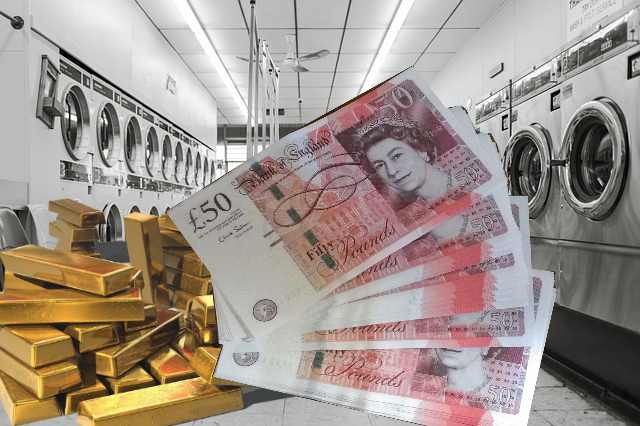SAMPLE | Pro ceeds of Crime & Money Laundering
©2019 Clearer Than Ever
Pro ceeds of Crime & Money Laundering.

Take a look through the text of one of our courses here for free.
Pro ceeds of Crime & Money Laundering.
Who is it for? Anyone who is involved in the selling, or administration of general insurance products.
Duration : Approximately 20 minutes.
What is the purpose of this module?
To raise awareness of the ways criminals try to use financial systems to hide the pro ceeds of crime, and what you should look out for.
- Objectives:
- Learn what is meant by the Pro ceeds of Crime,
- Understand what Money Laundering is,
- Gain insight into how Money Laundering works,
- Identify and avoid potential suspicious activity,
- Know what to do if you suspect a Money Laundering attempt.
What are Pro ceeds of Crime?
Crimes are committed to gain something illegally. The gain may be money, property, goods or other types of benefit. These are the pro ceeds of crime.
Criminals use these pro ceeds to buy goods and property, make investments and pay for insurance, as well as to fund further crimes.
Anything paid for by money made from crime also becomes a pro ceed of crime and may be confiscated on conviction.
A drug dealer using drug money to buy a car could lose both the car and the money when found guilty.
The law exists to strip criminals of illegally acquired gains, so they do not benefit from the pro ceeds of their crimes.
Pro ceeds of Crime.

In 2012 two Scottish businessmen were prosecuted successfully and had their assets worth almost �1 million confiscated, as well as their expensive cars and three luxury homes.
Russell Stirton and his business partner, Alexander Anderson, were branded �ruthless criminals� by the judge, who found them guilty of money laundering.
They had made money from drug dealing, gun running, extortion and fraud.
The money was laundered in a variety ways, including buying and selling cars, purchasing insurance policies and investments and processing cash through businesses controlled by the pair.
Mr Macniven, Head of the Scottish Civil Recovery Unit, said �Our focus is on depriving criminals of their assets and to ensure that any pro ceeds of crime are recovered and put to good use in our communities."
What is Money Laundering?
Money Laundering is the process criminals use to make the pro ceeds of a crime appear legitimate, ie to make �dirty� money appear �clean�.
Why do criminals launder money?
Criminals need to hide the true source of the money they get from committing crimes to avoid detection.
By laundering money, criminals hope to make it difficult for anyone to trace their wealth back to a crime.
Criminals have devised many ways of making the �dirty money� from a crime appear to come from �clean� and innocent sources, including abusing the general insurance industry.
The 'Pro ceeds Of Crime Act 2002' makes it a criminal offence to launder money, to prevent criminals from enjoying the pro ceeds of their crimes.
A simple example...

A robber breaks into a small business and steals over �10,000 in cash from a safe.
The robber wants to use the money to book a luxury cruise for himself and his girlfriend. However he has to pay for the cruise online, using his debit card.
The criminal knows a bank would ask questions if he tried to deposit a large amount of money, because their staff have been trained to look out for attempts at money laundering.
The robber decides to �launder� the money.
He buys a series of used cars, each paid for in cash. Then he sells the cars via legitimate secondhand car websites, getting paid by bank transfer each time.
The money in his bank has now comes from legitimate sources.
The robber has successfully laundered the dirty money; he can now go on a spending spree, and book his cruise easily.
Crimes that benefit from money laundering.
Serious crimes that benefit from money laundering include:
- drug trafficking,
- terrorism,
- fraud,
- robbery,
- prostitution,
- illegal gambling,
- gun trafficking,
- bribery and corruption.
How money gets laundered.
Money laundering schemes can be very simple or highly sophisticated. Most sophisticated money laundering schemes involve three stages:
Placement - where the criminal tries to place criminal money into the legitimate financial system. This is the hardest part for the criminal and the point at which you are most likely to come across them;
Layering - the process of moving money around the financial system through complex webs of transactions, often via offshore companies. The attempt to obscure the financial trail of the money is at the heart of the laundering process.;
Integration - the process by which criminal money ultimately becomes absorbed into the legitimate economy, for example through investment in property.
Prosecutions for money laundering can involve any of these stages in the money laundering process.
Example of Placement.
Su sie was working in an insurance office when she took a call from a person wanting to buy a policy for cash.
The caller wanted to know whether the policy could be cancelled if need be, but didn�t seem at all interested in the benefits of the policy, or the fairly high cancellation charge, or even that it was much cheaper to pay by direct debit.
Sus ie was a little suspicious, and made an excuse to speak to her supervisor in private.
Her supervisor agreed with Sus ie that the call was suspicious, and took over dealing with the en quiry, eventually reporting the caller�s details to the Police.
Su sie later learnt that the caller had been a pimp, trying to launder money he�d taken from prostitutes by buying insurance, then cancelling it to get the funds paid into a legitimate bank account.
Why do financial services need to be alert?
Financial services need to be alert because they hold, control and manage money and property belonging to other people. Because of this, financial services are potentially vulnerable to abuse by money launderers.
Insurance policies which can be cashed in are an attractive way of laundering money, because they allow a criminal to put �dirty� money in and get �clean� money out, in the form of a payment from a reputable insurance company.
The crime of Money Laundering.
The law concerning Money Laundering is covered by The Pro ceeds of Crime Act 2002 part 7 (known as �POCA�).
Under Part 7 of the act, a person commits an offence if they:
- Conceal, disguise, convert or transfer criminal property, or remove it from the UK.
- Enter into or become concerned in an arrangement which they know or suspect helps someone get, keep, use or control criminal property.
- Acquire, use or has possession of criminal property.
Part 7 also requires financial institutions and businesses in the regulated sector to report to the UK Financial Intelligence Unit (part of the National Crime Agency), any suspicions about criminal property or money laundering.
It is also a crime under the act to �tip off� a person or let them know that a Suspicious Activity Report has been made about them.
Example.
Dawn�s boyfriend, Andy, was a drugs dealer.
Andy pursuaded Dawn to hide the cash from his drug dealing. (Andy had transferred criminal property to Dawn.)
Dawn kept the cash hidden in a closet in her flat. (Dawn had concealed criminal property)
Eventually Andy asked Dawn to convert the cash into Euros, which he took abroad and used to buy more drugs. (Andy had removed criminal property from the UK)
Andy exchanged some of the new drugs for a car. (Andy had converted criminal property.)
Both Dawn and Andy had now committed multiple Money Laundering offences.
Signs to look out for.
It is important to take care when commencing business with a new customer, particularly being aware of suspicious, or unusual activity, when dealing with customers.
Use your �Know your customer� training to help you.
Some typical signs that should make you suspicious include:
- A customer who tries to purchase an insurance product using a single, large, premium payment, especially if the payment is made by an unusual method, for example a large sum of cash, transfer from a foreign account or travellers cheques.
- A customer wants to buy a product, but strangely shows little or no interest in the details of the product, other than the early termination features.
- A customer who is in a hurry or seems reluctant to provide information, or is unwilling to provide documents that would enable proper identification.
- A customer wants to transfer the benefit of a product to an apparently unrelated third party, or wishes to have an introducer�s commission paid to a third party.
Unusual payment?
Amy had a customer who was interested in purchasing a particular insurance product. This was a new customer, so Amy was particularly alert.
The customer insisted on making a single, large premium payment and Amy became suspicious.
Amy became even more suspicious when the customer wanted to make the payment by cash, which would was unusual, especially for such a large sum.
Amy took the customer�s details and handed the enquiry over to her line manager, making sure to point out her suspicions discretely.
Be alert:
If a customer tries to purchase an insurance product using a single, large premium payment, especially if the payment is made by an unusual method, for example a large sum of cash, transfer from a foreign account or travellers cheques, it is a sign of potential money laundering.
An odd interest?
Richard was approached by a potential client who wanted details on one of the products he sold. However Richard was at first surprised the client�s insistence on knowing what the early termination features were, and he became suspicious when the client showed little or no interest in the other details of the product itself.
Richard flagged this potential client as a possible money launderer.
Be alert:
A customer who wants to buy a product, but strangely shows little or no interest in the details of the product, other than the early termination features, may be trying to place criminal pro ceeds.
Too rushed for details?
Nadine received a call from a woman who wanted to purchase a financial product.
However the woman was in a great hurry to make the transaction. Nadine was suspicious when the woman appeared reluctant to provide information that would normally be provided, especially as it would help provide proper identity checks.
Nadine made an excuse to decline the transaction, without letting the woman know she was suspicious, and reported the incident, having noted the woman�s details and request.
Be alert:
A customer who is in a hurry, seems reluctant to provide information, or is unwilling to provide documents that would enable proper identification, could be a potential money launderer.
Don�t pay me...?
Dave took a call from someone who was keen to introduce a new customer to Dave�s company.
Dave�s company usually paid an �introducer�s commission� on such occasions.
However, Dave became suspicious when the caller said �I�m moving banks at the moment, so pay the commission direct to my colleague, and he will pay me later, once my new account goes live�.
Dave was not convinced this was a legitimate enquiry and quietly passed on his suspicion to his supervisor.
Be alert:
Money launderers will sometimes try to transfer the benefit of a product to an apparently unrelated third party, or have an introducer�s commission paid to a third party.
What if you suspect a member of staff?
If you suspect a member of staff of breaching the Money Laundering policy of your organisation, or engaging in unethical, or potentially illegal behaviour, you must take appropriate action.
Appropriate actions include:
Making use of any safe and anonymous reporting methods provided by your employer.
Making sure you do not tip off the person you are suspicious of, or let them know you are suspicious;
Reporting the matter immediately to your line manager or Money Laundering officer;
Making notes of what was said, or asked for, by the person, along with times, so that it can be used as evidence if necessary.
Summary.
In this module we have looked at what Money Laundering is and what is meant by the Pro ceeds of Crime.
We have seen the types of serious crime that use money laundering, and looked at some of the ways in which money laundering works.
We have looked at some of the ways criminals try to abuse the general insurance industry, to place pro ceeds of crime as part of their money laundering activities.
Because you work in an industry that deals with money, you must stay alert to the possibility that someone might try to process the pro ceeds of crime by laundering money.
This was a sample of the text from one of our courses.
You can ask your staff to look at this course by giving them the link to this sample.A much better idea would be to register and purchase licences (they start at only �10 per person per course, so you get the full benefit of easily managing who's taken the training, and whether or not they have passed the short test that follows each module.